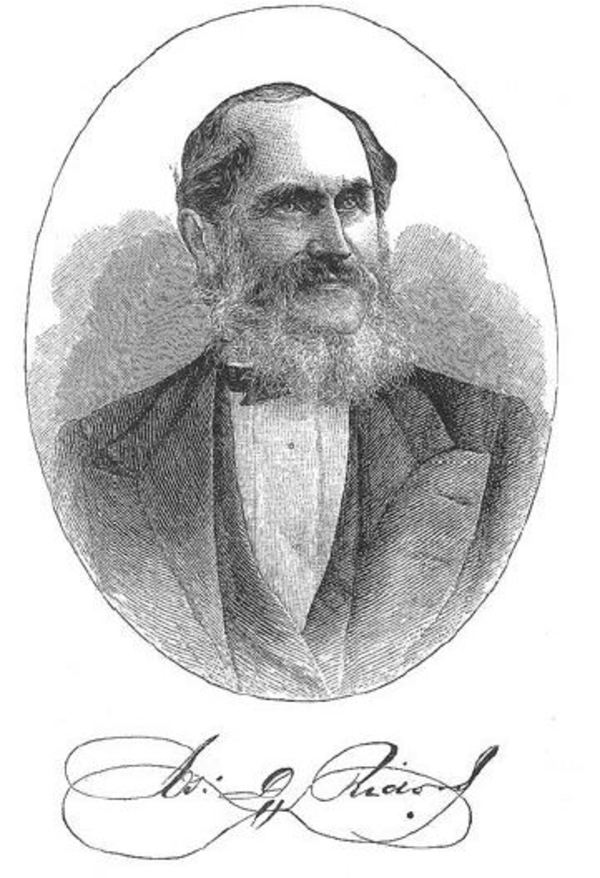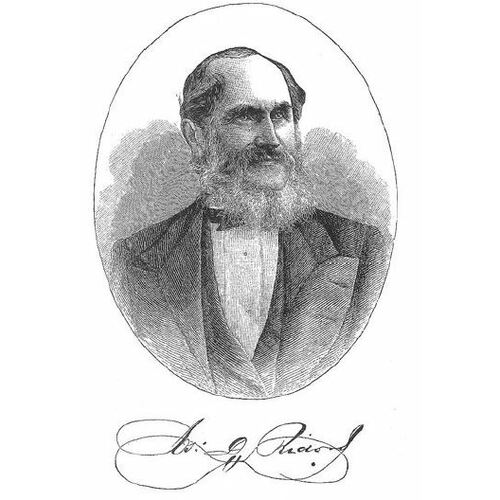
Source: Link
RIDOUT, JOSEPH DAVIS, merchant and businessman; b. 9 June 1809 at Bristol, England, son of George Ridout and Mary Ann Wright; m. first Julia Elizabeth Gould, née Bramley, and after her death in 1852, Caroline Cumberland; d. 4 June 1884 at Toronto, Ont., survived by his second wife and their two sons.
Joseph Davis Ridout’s father emigrated from Bristol in 1820, going first to Philadelphia and then in 1826 to York (Toronto). Like his older brother George Percival*, however, Joseph remained in the United States, where he was employed, in New York and then in Boston, by Tarratt’s, a firm of iron merchants based in Wolverhampton, England. In 1830 Joseph moved to York and, with the backing of Tarratt’s, opened a retail iron and hardware store, Joseph D. Ridout and Company. His brother George Percival joined him in 1832, and their firm, Ridout Brothers and Company, entered the wholesale market as well. They soon built a substantial store, which would long be a Toronto landmark, at the northeast corner of King and Yonge streets.
Business success permitted and encouraged J. D. Ridout, like other Toronto wholesalers, to broaden his activities. In 1847 he helped found the Farmers and Mechanics Building Society, a mortgage company and the city’s second such effort to supply construction capital for a growing population; he was its first vice-president and later became its president. The societies consisted of subscribers who paid set monthly subscriptions for a limited period of time in return for the right to borrow on mortgages to finance building projects. The societies were popular with businessmen, professionals, farmers, artisans, and clerks because they required little initial capital, met a clear and pressing need, and when wound up usually had surpluses which were distributed among the shareholders. Ridout was one of those who saw the advantages for investors and borrowers of developing permanent instead of terminating building societies. When the Farmers and Mechanics Building Society was dissolved in 1855, he and other members of the society and of the Toronto Building Society, established in 1846, joined to form the Canada Permanent Building and Savings Society (later the Canada Permanent Mortgage Corporation) [see Peter Paterson]. Ridout was its first president and held the office for almost 30 years until forced by ill health to retire shortly before he died. Active day-to-day management of the company was in the hands of its capable secretary, John Herbert Mason, but Ridout was much more than a figure-head as president. Under their leadership, the company soon became much larger than any other of its kind in Canada.
Ridout’s family and business lives were interconnected. From 1843 until it failed in 1866 he was a director of the Bank of Upper Canada, whose cashier (general manager) from 1821 to 1861, Thomas Gibbs Ridout*, was his cousin, and the husband of his first wife’s sister. He was a member of the first board of the Toronto, Simcoe and Lake Huron Union Rail-road Company in 1849 and took a continuing interest in its affairs; about a decade later, when the company, by then the Northern Railway, was in financial difficulties, Ridout rejoined the board for several years. Frederic William Cumberland, general manager of the Northern Railway from 1859 until his death in 1881, was married to a sister of Ridout’s first wife and was the brother of his second wife. Ridout was active in the Toronto Board of Trade, particularly in its early years when his brother Percival was its president, and he was himself vice-president in 1854. With his brother he engaged in some land speculation in and around Toronto.
Ridout was Anglican in religion and Conservative in politics. He took no active part in political life except as a trustee of the first elected Toronto Public School Board in 1850. He joined the East York militia in 1833, saw action during the rebellion of 1837, and remained in the militia until 1867 when he retired with the rank of major. He helped to found Toronto’s St George’s Society in 1835 and was its president from 1851 to 1854. For some years a director of the Toronto Mechanics’ Institute, he served as its president in 1860.
After his brother retired from the hardware business in 1866, Ridout took two long-time employees, James Aikenhead and Alexander Crombie, into the firm, changing its name to Ridout, Aikenhead, and Crombie. In 1876 he retired from the hardware business, leaving his partners to carry it on. The business still continues in the hands of the Aikenhead family, though it is now owned by Molson Companies Limited.
Christian Guardian, September–October 1830. Globe, 1850–60. Monetary Times, 1868–84. Toronto Daily Mail, 5, 9 June 1884. Dominion annual register, 1884; 242–43. Toronto directory, 1850–51; 1856; 1859–60; 1861; 1866; 1867–68. Hist. of Toronto and county of York, II: 137–39. Robertson’s landmarks of Toronto, I: 329, 360a, 368–69; II: 759; III: 143, 208–9, 211, 246. The story of the Canada Permanent Mortgage Corporation, 1855–1925 (Toronto, 1925). Michael Valpy, “Aikenhead’s business was founded in 1830: notes for a store’s history,” Globe and Mail (Toronto), 7 June 1971.
Cite This Article
Douglas McCalla, “RIDOUT, JOSEPH DAVIS,” in Dictionary of Canadian Biography, vol. 11, University of Toronto/Université Laval, 2003–, accessed December 30, 2025, https://www.biographi.ca/en/bio/ridout_joseph_davis_11E.html.
The citation above shows the format for footnotes and endnotes according to the Chicago manual of style (16th edition). Information to be used in other citation formats:
| Permalink: | https://www.biographi.ca/en/bio/ridout_joseph_davis_11E.html |
| Author of Article: | Douglas McCalla |
| Title of Article: | RIDOUT, JOSEPH DAVIS |
| Publication Name: | Dictionary of Canadian Biography, vol. 11 |
| Publisher: | University of Toronto/Université Laval |
| Year of publication: | 1982 |
| Year of revision: | 1982 |
| Access Date: | December 30, 2025 |



